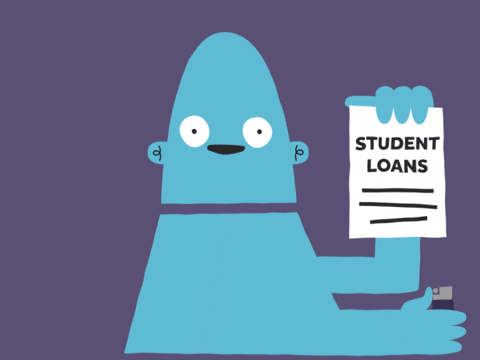When you’re fresh out of B-school and making a six-figure salary, it’s tempting to rush to pay off your student loans. But is that the best financial move? It depends.




Growing up, you knew you were going to college, it was just a matter of where. And a master’s in business administration? That MBA was also part of the plan. But did you think about how you’d pay for all those classes and degrees? For most students, federal financial aid makes that dream education possible, but it saddles them with serious debt.
Americans currently owe $1.59 trillion in student loan debt, according to Q1 stats from the Federal Reserve. Once they hit the workforce, many young professionals want to get out from under their mountains of student debt—and fast. But hold up.
It can be tempting to start paying off your student loans in larger chunks or even altogether. For some professionals, that’s a good plan. Others may want to consider different financial moves first. Not sure which side of the proverbial fence you’re on? We’ll take you through the options.
To give Americans some financial relief, the Biden administration has halted student loan payments, waived interest and stopped collections activity on defaulted loans through August 31, 2022. More than two years of federal student loan forgiveness has helped 41 million borrowers save an estimated $5 billion per month.
If you work in the public or non-profit sectors, you’ve benefitted from recent policy changes as well. The Biden administration temporarily expanded the Public Service Loan Forgiveness program, which forgives any remaining federal loans after a borrower works for the government or a non-profit and has made 10 years of qualifying payments.
More help could be on the way. Later this summer, the Biden administration is expected to either extend the payment suspension or possibly offer some amount of federal loan forgiveness. Some proposals circulating in Washington D.C. call for forgiving $10,000 student loans per borrower (a plan President Biden supports), while a group of Senators is calling for $50,000 of forgiveness.
Whatever the final decision, any forgiveness will have a huge impact on federal student loan repayment. About 43% of Americans who have attended college have some student loan debt and 95% of that debt is in the form of federal and private student loans, according to the Federal Reserve.
The federal government has been keeping borrowers from falling behind on their payments or defaulting on their loans, but it won’t last forever. Eventually, you will have to start repaying your loans, so you should be ready. Check with your loan servicer to get the most current information on:
You may be ready to start repayment ASAP—who wants to sit under a mountain of debt longer than they have to?. But let’s lay out the pros and cons of paying off student loans early.
Student debt weighs heavily on many Americans. It can be hard to focus on your professional life when those monthly bill reminders show up in your inbox. Is it a good idea to pay off student loans early? For some people, the answer is yes. You won’t face fees or charges for repaying your federal student loans ahead of schedule. In fact, reading “preaid in full” would feel really good.
If you’re determined to become debt free and you’re making good money, you may be in a position to pay off your student loans. Depending on your cash flow, you could increase your monthly payments or cut a large check.
Either way, reducing your loan principal will set you on a path to financial freedom and reduce your principal and interest. If you’re wondering if you should pay off student loans in one lump sum, that depends on your cash flow. If you get a big bonus or come into some inheritance, that could be a great use of that money.
If student loans are your only form of debt, well done. Many Americans struggle with high-interest credit card debt, or might have a car loan or mortgage. If you’re not one of them, you have financial flexibility.
If you’re a young professional living in a big city, you probably rent your apartment and take public transportation, freeing you from car and home loans. So, if you have extra funds to pay down the student debt, go for it. (Although, the money you’re spending to travel to all those rescheduled Covid weddings this summer might put you in the red.)
When you pay off debt of any kind, including student loans, it has a positive impact on your credit score. Here’s why: One-third of your credit score is determined by your “debt-to-income” ratio, which is the amount of debt you have compared to the money that you earn. The less debt you have, the better your ratio, which can boost your credit score. With a strong credit score, you’ll have access to the best rates on credit cards and loans.
Is there any downside to paying off your student loans early? Depending on your financial situation, there could be.
No one likes to look at student loan statements and see a huge balance, but aggressively paying off student loans isn’t always the best play. Here’s why you might want to reconsider.
As a rule of thumb, you should always pay off your highest interest debt first, since that compounding interest is costing you the most in extra charges.
The federal student loan interest rate is typically lower than other forms of debt, including high-interest credit cards. The average federal student loan interest rate for Direct Loans from July 2021 to June 2022 was 3.73%. That means student loans have significantly lower rates than most credit cards, which have average rates between 14% and 19%.
With the economy possibly headed for a recession—gulp, we said the “r” word—you need to take stock of your finances. Ideally, you’ll have three to six months of expenses in savings as an emergency fund. After all, even investment banking isn’t immune to layoffs. It’s also a good idea to contribute to your company’s 401(k) plan, particularly if your employer matches your contributions. If you don’t have the financial ability to save for these purposes, you’re not ready to start paying back your student loans early. Stick with regular monthly payments and keep chipping away.
The stock market is teetering on a bear market, so this might not seem like the best time to invest, but you should consider opportunities to earn a positive return. Some stocks are safer bets than others, particularly if they pay a dividend, or you could invest in Treasury or municipal bonds. The point is, if you have extra money, you might want to invest it and earn a return rather than paying off low-interest debt.
When it comes to paying off your student loans or holding onto your cash for other purposes, we’re in highly personal territory. Some borrowers want to get their student debt off the books and move on with their financial futures—and they have the cash flow to make it happen. What happens when you pay off your student loans is you’re free to focus on other financial goals and responsibilities.
While quick repayment is tempting, some young professionals may need to stay the course and keep making regular payments (at least until a windfall comes along). You need to keep your money for daily living and paying off other debts.
Either way, keep an eye on the latest government policy and be ready to start making payments if and when it is required.